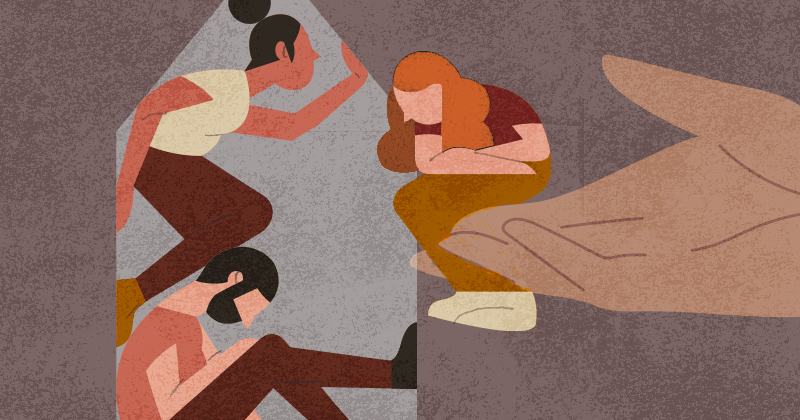


Support during the transition to adulthood
Illustration by Jeffrey C. Chase June 26, 2025
University of Delaware Assistant Professor Eric Layland demonstrates why mental health support is critical for Black, Latinx and Afro-Latinx sexual minority men
For many communities across the nation, Pride Month is a time to celebrate the challenges that LGBTQ+ people have faced and overcome. But the month of June also reminds parents, educators and human service professionals that LGBTQ+ individuals continue to grapple with the mental health effects of social stigma, especially during the transition to adulthood. In a new study, University of Delaware Assistant Professor Eric Layland demonstrates why mental health interventions are critical forms of support for Black, Latinx and Afro-Latinx gay, bisexual and other sexual minority young men.
Layland and his co-authors studied the mental health trajectories of more than 400 Black, Latinx and Afro-Latinx young men who experienced racism, heterosexism or both from family, community members, police and others during adolescence and early adulthood. Among other results, they found that young men who experienced both frequent racism and frequent heterosexism experienced the highest levels and earliest peaks in anxiety, with their symptoms only gradually declining by age 24.
“The transition to adulthood is a time when mental health challenges often emerge and escalate,” said Eric Layland, who specializes in LGBTQ+ development and affirmative interventions in the College of Education and Human Development’s (CEHD) Department of Human Development and Family Sciences. “This study emphasizes how multiple sources of discrimination converge to impact the mental health of sexual minority men of color.”
A comprehensive framework
Over a period of three years, cisgender young men between the ages of 18 and 29 answered questions about their personal experiences with racism and heterosexism, responding to survey questions like “How often have you been treated rudely or unfairly because of your race or ethnicity?” and “How often have you had to move away from friends or family because of your sexuality?” The researchers assessed the complexity and severity of the stigma their participants experienced, while also measuring their symptoms of anxiety and depression.
“An intersectional approach considers not only the multiple social positions people have but also how they are treated differently based on convergence of those multiple social identities,” Layland said. “By identifying groups of young men with different lived experiences of intersecting racism and heterosexism, we can then check to see whether these groups have worse depression and anxiety across development.”
For participants overall, Layland and his co-authors found that the transition to adulthood was marked by increasing then declining anxious symptoms, with a peak in symptoms around ages 20 to 23. Layland and his co-authors similarly found that depressive symptoms peaked around ages 18 or 19 for these subgroups and then declined after age 24.
But for participants who experienced complex patterns of both racism and heterosexism — what Layland calls “compound stigma” — symptoms of anxiety and depression occurred earlier in adolescence and with greater severity. This group continued to experience more severe symptoms until age 24, when their levels of anxiety and depression became comparable to other groups and began to gradually decline.
“Results tell us that the transition from adolescence to adulthood is a challenging time for mental health, but anxiety and depression were the worst for young men who were experiencing frequent racism and heterosexism across many relationships and contexts,” Layland said. “It’s concerning that at an age when these young people need extra support to launch into adulthood, instead they are experiencing so much rejection and discrimination for their race, ethnicity and sexual orientation.”
The importance of early mental health interventions
With these findings, Layland and his co-authors emphasize the need for mental health interventions that support Black, Latinx and Afro-Latinx sexual minority men with the skills to respond to complex forms of prejudice. These interventions could provide opportunities for participants to practice responding to and reframing their experiences of stigma. They could also be sources of social support and connection among peers with similar experiences.
“We need clinical and community resources that are adapted to address the intersecting discrimination experienced by sexual minority men of color, especially in their late teens in early twenties,” said Layland. “These resources can be coupled with opportunities for celebrating resilience, connecting to rich cultural history and building thriving communities of color. At the same time, we also need white and heterosexual allies to do their own work to reduce prejudice and shut down intolerance.”
Resources for UD students
UD’s Office of Student Diversity and Inclusion offers many resources for LGBTQ+ students, students of color and UD community members, including community-building programs, gender-inclusive housing, gender-affirming care resources and LGBTQ+ education workshops. UD’s Student Health Services also ensures that all genders, gender identities and sexual orientations have access to healthcare that meets their individual needs.
In partnership with UD’s Center for Counseling and Student Development, Student Diversity and Inclusion also offers Lavender Chats, a support group that can help LGBTQ+ students navigate challenges, and QTPOC & Coffee events for queer, trans+ and people of color. Students may also consider joining the Lavender Programming Board, the Queer and Trans Graduate Student Union, the Black Student Union or other student organizations.
Delaware community members may consider joining I Am Me, Inc. a non-profit for LGBTQ+ people with affinity groups for people of color, or Alphabet Soup Kids, a support and social group for LGBTQIA+ youth between the ages of 12 and 18 offered through Jewish Family Services.
This research was supported with funding from the National Institute on Drug Abuse, the National Institute on Mental Health and the University of Delaware.
Contact Us
Have a UDaily story idea?
Contact us at ocm@udel.edu
Members of the press
Contact us at mediarelations@udel.edu or visit the Media Relations website

